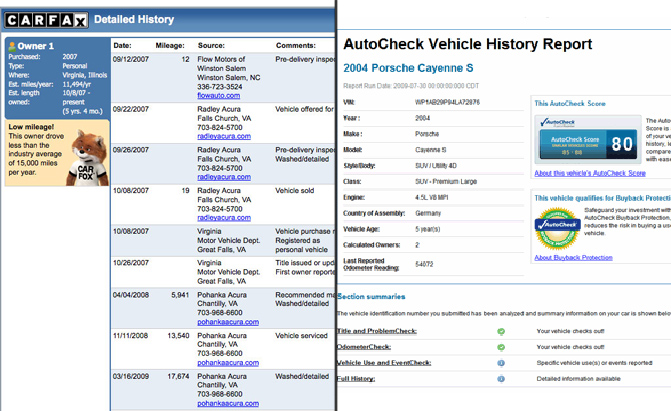Not every lemon is a lost cause. Some can be labeled incorrectly or have perfectly manageable issues. Here’s what to do if you find a used car that may be too good to be true and titled as a lemon.
In case you need a quick reminder, a lemon is a car that has reoccurring issues. These reoccurring issues resulted in the previous owner suing the automaker, claiming that they were sold a faulty vehicle. The automaker then bought back the vehicle, and for whatever reason, (likely the car was deemed repaired) the car can be auctioned back to a dealership and re-enter circulation.
Here’s some helpful information on what you can do if you encounter one while looking for a used car to buy.
ALSO SEE: What is a Lemon?
1. Get a Vehicle History Report
When it comes to buying used cars, there is no better first step than to get a car history report. There are two well-known services that provide this information for a low cost: and both provide information that is invaluable to anyone looking at buying a used vehicle. The reports allow you to see how many previous owners there were, if it was involved in any accidents, how many times it needed repairs and what the current title is. The last bit is among the most important parts, as it’s where you’ll find the lemon label to confirm that this car did go through the proper legal process to be deemed a lemon.
Dealers are not legally required to disclose if a car has a lemon title, but in some states, dealers do have to tell a buyer if the car is a manufacturer buyback, which is a good indicator if a car is a lemon or not. Regardless, it’s up to the consumer to do their due diligence to check into the car’s history. If a consumer unknowingly buys a used lemon, they might be out of luck because it was their responsibility to check in the first place.
2. Owner History
On the vehicle history report, you’ll see the owner history, which should say if the car has been bought back by the automaker. That’s a surefire way to tell if the car was deemed a lemon, as owners can claim a car is a lemon in a legal case and get the automaker to buy back the faulty vehicle. You can also tell if the car changed hands before being titled a lemon, meaning that perhaps another owner found an issue that a previous owner didn’t notice. It could also mean that the reoccurring problem with the car isn’t an obvious one.
3. Repair History
Take a close look at the repair history of the vehicle and try to note any reoccurring repairs. Car history reports of lemons will have reoccurring issues that are easy to notice. You can also see if the car’s problems are a wear and tear issue like with the clutch or brakes, or a more serious issue. Furthermore, see if the repairs were required or performed even when the vehicle was new. That can help confirm whether the car is indeed a lemon, or if there was an event that caused an improperly diagnosed problem, like a collision or modification.
Are the repairs serious or superficial? A serious repair would involve the powertrain or suspension, while a superficial one would only relate to things that don’t have to do with the act of driving, like the window or seat controls. Serious repairs would be more difficult to deal with, but if a lemon was deemed as such for a more superficial reason, it might not be a huge pain to deal with.
In the report, you can also see if repairs are happening at a dealership or a general shop. Take a look at the general maintenance and health of the vehicle, and see if the regular maintenance has been performed too, just like you would with any used car. This will help you decide if you should consider buying this vehicle or not.
4. Pre-Purchase Inspection
Is the car still worth buying? If the issues aren’t too worrisome or if you think the car may have been mislabelled as a lemon, then you should get a pre-purchase inspection for it. A mechanic will be able to better understand why the vehicle was labeled a lemon and whether or not the issues are fixable. Some people may think that a reoccurring problem may hint at further issues or quality concerns, and a mechanic can help you decide if that’s true or not.
Their confidence in the vehicle can go a long way towards knowing if the car is worth buying or a lost cause.
ALSO SEE: Toyota Tops, Fiat Flops in AutoGuide’s 1st Annual Lemon List
5. Bargain
Even if the car is a lemon, it may still be perfectly drivable. Realistically, a car can be a labeled a lemon even if there’s just something wrong the passenger side window that won’t open, a CD player that won’t play a certain CD or maybe just an unexpected ticking noise from the engine that may just be the direct injection system. That doesn’t mean it’s not worth buying. But since a car has that lemon label, it will have a seriously hindered resale value. You can use this as a bargaining chip to get a lower price on the vehicle. Keep in mind what the pre-purchase inspection revealed about the car, as the vehicle could need some attention after purchasing in order to be safe and reliable.
That last word is the most important part of this whole question. Is the car going to be reliable to drive, despite having some known issues? Are the issues and headaches something you can deal with? If so, then make an offer. As the car is a lemon, it won’t be easy for the seller to get rid of.
Every used car comes with some kind of caveat or compromise. At least a car labeled as a lemon comes with some documented history as to what may be wrong with it. If a used car listing is too good to be true, then go in with your eyes wide open and do your research. A used car history report and pre-purchase inspection can go a long way towards helping you decide if a car is worth the headache or not. But there are bargains hidden under the labels of Lemon, all you have to do is search and see.
See also: The 8 Cars with the Most Reported Lemons













